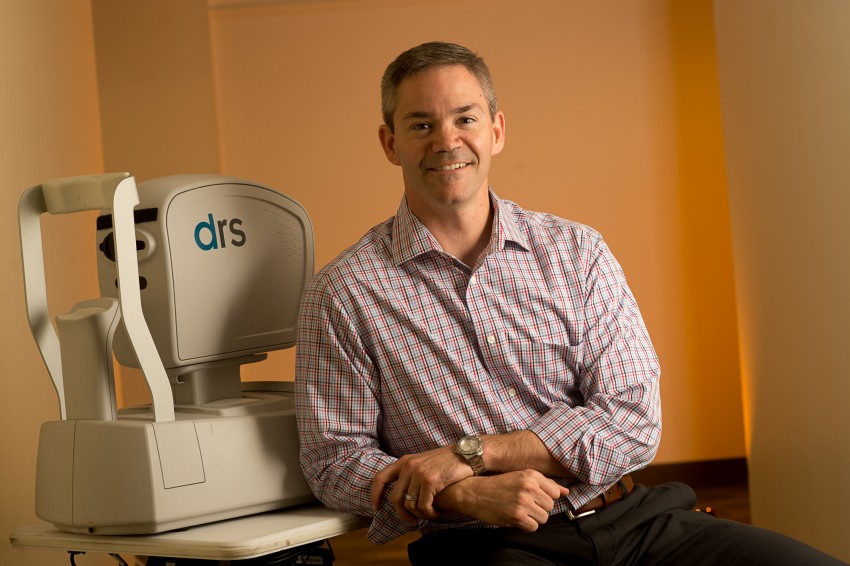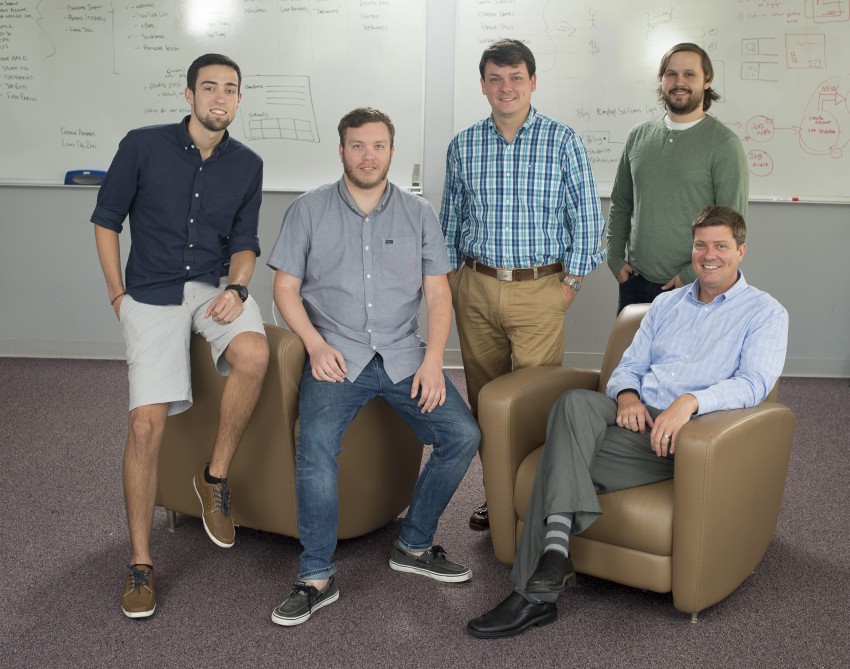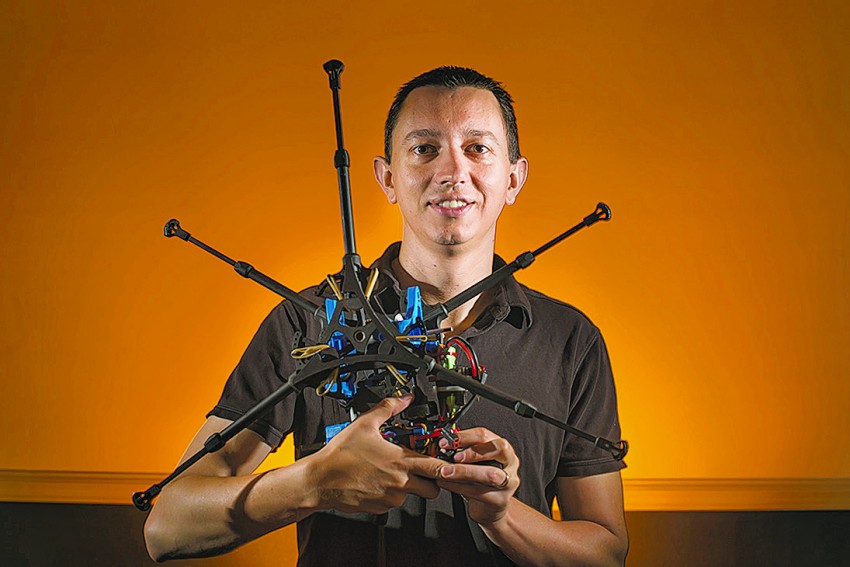Local Innovation Awards winners are making waves
- August 7, 2015
- / T.S. Strickland, Innovation Coast
- / community-dashboard

Jason Crawford, CEO, at Iris intelligent retinal imaging systems in Pensacola Wednesday, July 15, 2015. (Michael Spooneybarger/ Studer Community Institute)
Less than one year after the inaugural Innovation Awards showcased the best and brightest entrepreneurs from across the southeast, the three winning companies are going strong.
The winners are developing new products, expanding into other markets and making waves in their respective industries.
The awards, hosted for the first time last November, were sponsored by Innovation Coast, Space Florida and the Florida SBDC Network. The competition gave 20 companies – in fields ranging from healthcare to robotics to aerospace – the opportunity to present their products and services to a panel of experts, in front of an audience of entrepreneurs, industry leaders and potential investors.
Intelligent Retinal Imaging Systems took home top honors at the competition, receiving a $100,000 cash prize. Accountingfly placed second, winning $50,000, and Robotics Unlimited placed third, winning a $5,000 business services package.
All three have expanded their operations in the months since and are looking to expand further in coming months.
IRIS, founded in 2011 by retinal surgeon Sunil Gupta, has developed breakthrough, cloud-based retinal screening technology aimed at reducing the incidence of preventable blindness. Diabetic retinopathy is the leading cause of vision loss in adults – affecting just less than 30 percent of diabetics, or about 4.2 million people, worldwide.
“We are in the Diabetes Belt,” Gupta said, “which means we have more diabetics per capita than anywhere else in the country, and we know that every diabetic should be looked at every year to make sure they’re not starting to lose their vision. If we catch them early enough, we can keep 90 percent of them (or more) seeing.
“The problem,” Gupta said, “is that half the population doesn’t come to us in time.”
Data from the Florida Department of Health indicates that 12.6 percent of Escambia County residents have diabetes; in Santa Rosa County the rate is 8.8 percent. The state rate is 11.2 percent.
IRIS hopes to address this problem by providing turnkey technology that can be used by primary care doctors to screen at-risk patients for signs of retinal pathology.
When the company won the Innovation Awards last year, they had deployed the IRIS system at Harris Health System in Houston, one of the largest Federally Qualified Health Centers in the United States.
At the time, Harris had 47,000 diabetic patients. The company installed IRIS cameras in eight of its busiest primary care practices in the summer of 2013, with impressive results.
“We were able to take their screening rates from 52 percent to, now, 87 percent,” Gupta said.
The company’s success in Houston was followed by the FDA’s decision, earlier this year, to grant approval to the IRIS system, making it the only FDA-approved solution in the industry.
Gupta said the company had used about half the winnings from the Innovation Awards to secure a consultant who helped them navigate the approval process. The other half went toward hiring additional support staff.
IRIS’s early successes have created waves, and IRIS is expanding rapidly.
“Now, we are in 14 states,” Gupta said. “In the first quarter of 2015, we doubled our customer base … and I think we’re going to probably double it again in the next two quarters.
“We knew there was a gap in terms of quality for the patients who needed help,” Gupta continued. “It was a gap that was something everybody had identified. We shot for that gap, and we are the solution now that everybody’s looking to.”
Gupta hopes the company can continue to expand and make an impact globally, but he wants to keep his operations right here at home.
“If I could get 1,000 employees in Pensacola, nothing would make me happier,” he said.
Accountingfly growing
IRIS is not the only Innovation Award alumnus making waves.

From left, Casey Herman, Matthew Maxwell, Jeff Phillips, Kyle Schmitz and John Hosman at Accountingfly in Pensacola Wednesday, July 22, 2015. (Michael Spooneybarger/ Studer Community Institute)
One afternoon in June, Accountingfly CEO Jeff Phillips stood in the doorway of his third-floor office at downtown’s Center for Innovation and Entrepreneurship, looking a bit less frazzled than he should have.
He had spent the better part of the day juggling multiple crises: The phone lines had crashed. He and his partner were at odds over whether or not to acquire a smaller company, and his wife was days away from having a baby – their third. Still, Phillips was melon-cool.
“Just another day in the startup game,” he quipped.
Phillips – a Pensacola native – worked for such Internet giants as Trilogy Software and Monster.com before joining with fellow Pensacolians John and James Hosman in 2012 to found a national online job board geared toward the accounting industry.
The site they launched – initially dubbed “College Frog,” but later rebranded as Accountingfly – has grown steadily since then. In the year leading up to the Innovation Awards, the company grew by more than 300 percent, Phillips said.
Since then, he has been focused on refining the Accountingfly platform and scaling it for rapid growth – buoyed by the Innovation Awards funding, which allowed the company to hire additional staff. Phillips said they had accomplished the first part of that formula, working with early adopters to ensure they had the best possible product to meet their customers’ needs. Now, he says it was time to expand.
“It works, and we know it works,” Phillips said, “because we have firms calling us every week saying, ‘Hey, we made hires. This worked.’ The ball is in our court now.”
In June, the site was attracting about 10,000 job seekers and 400 job postings each month.
“That is a drop in the bucket for the industry,” Phillips said. “We’ve made it work for a few people. Now, we have to make it work for a lot of people.”
The company is in the process of soliciting additional funding so they can hire more sales and development staff to continue to grow the business.
“Now, we’re in the third stage of the startup game,” Phillips said, “rapid growth. We have to grow rapidly so that another competitor, with more funding, doesn’t step in and fill this niche in the marketplace.”
Robotics Unlimited
Just down the hall from Phillips’ office is the headquarters of Robotics Unlimited, which placed third in last year’s awards. Like their peers, CEO Sebastian Cotton and Chief Technology Officer Colton Black have been busy since the competition.

Sebastien Cotton started Robotics Unlimited to market a running robot developed by Cotton and a team at the Florida Institute for Human and Machine Cognition. Michael Spooneybarger./Studer Community Institute
The duo, who co-founded Robotics Unlimited in 2012, met at the Florida Institute for Human and Machine Cognition, where they were part of a team of researchers developing “Fastrunner” – a DARPA-funded effort to build a better running robot.
Here's video of the HexRunner project from IHMC:
DARPA slashed their funding before a working prototype could be created — but not before the team had built a six-legged robot, called Hex-runner, that demonstrated many of their concepts. It was faster and more energy efficient than anything on the market and was capable of performing well on a variety of rough terrains.
Seeing promise, Cotton decided to license the technology from IHMC — with the intent of further refining and commercializing it. He asked others on the team to join him before deciding to cast his lot with Black.
Today, Cotton and Black have four full-time employees and are paying the bills by consulting for several regional firms. They have their eyes on the future, though.
In May, the company sold their first robot to one of the world’s leading manufacturers of high-tech toys. Cotton said it would likely take two years to bring the toy to market and turn a profit.
However, they hope that revenue will be substantial enough to carry them through to the next phase of their business plan — which is to market their drones to the defense industry, for use in border surveillance and related applications.
In the meantime, they are hard at work developing new products and soliciting capital.
Black said they hoped to wrap up their initial round of investment by July — just in time for his 21st birthday — with the goal of raising $600,000.
The two are also considering applying to a security-focused business accelerator in San Diego.
If they are accepted into the program, it could raise the company's profile and valuation and introduce them to deep-pocketed venture capitalists.
Even if that were to happen, though, Cotton said the company was committed to Pensacola.
"We will stay in Pensacola for sure," he said.
Innovation Coast is an alliance of technology and knowledge-based companies in Northwest Florida. Its mission is to grow, sustain and showcase the region's successful, vibrant technology community while attracting new business and investors to the area. Innovation Coast works in cooperation with other economic development agencies, including University of West Florida’s Center for Research and Economic Opportunity, to help grow the area’s successes, talent and potential.
 CivicCon launches with a look at good growth in cities
CivicCon launches with a look at good growth in cities
 Building stronger brains one baby, one parent at a time
Building stronger brains one baby, one parent at a time
 SCI debuts commercial on Early Learning City
SCI debuts commercial on Early Learning City
 Entrecon: World class speakers and an opportunity to sharpen skills
Entrecon: World class speakers and an opportunity to sharpen skills
 PYP Quality of Life survey 2017
PYP Quality of Life survey 2017
 EntreCon Pensacola 2016: A look back
EntreCon Pensacola 2016: A look back
 Leadership tip: getting better employee takeaways
Leadership tip: getting better employee takeaways
 Leadership tip: be interested instead of interesting
Leadership tip: be interested instead of interesting
 Leadership tip: delivering difficult messages
Leadership tip: delivering difficult messages
 Brain Bags boost Arc, Early Childhood Court programs
Brain Bags boost Arc, Early Childhood Court programs